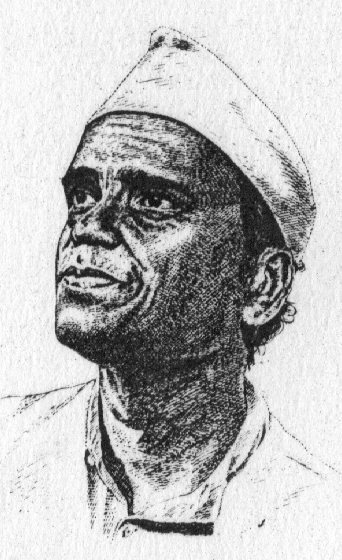Sane Guruji : A Biography
First Published on: January 12, 2006 in Amma's Column
Page Last Updated: December 07, 2024
Pandurang Bhaurao Sane, popularly known as Sane Guruji was born in a poor but very cultured family at Palgad in Ratnagiri district of Maharashtra on 24th of December 1899. His father Bhaurao, was a freedom fighter and was jailed during Swadeshi movement. His mother Yashodabai was a kind and virtuous woman, who tried to teach real values of life to her children. She left a powerful influence on young Pandurang, who later immortalized her in his most famous novel, "Shyamchi Ayee". The beautiful surroundings of Konkan, roused the poetic instincts of Pandurang. He started writing poems while in school. He had to continue high school and college studies in abject poverty and lost his mother, just after he appeared for the matriculation examination. This left him completely shattered. He was a very sensitive person and continued to be so till the end. The political upheaval in the country roused his patriotic spirit and he started writing articles to nationalistic periodicals. He opted for Sanskrit and Marathi languages for his B.A. degree and philosophy for his Masters degree.
A gifted orator, he chose teaching as vocation in which he excelled and earned the title as "Guruji" (revered teacher) in no time. He believed more in practicing than preaching and opted to serve in a rural school, where he also accepted the responsibility of warden of the hostel. The boys were very fond of him as he made them sing, play and narrate stories. He bestowed motherly affection on them. He planted trees and asked to celebrate the "Festival of Buds", and taught to imbibe love of nature. He started a magazine "Vidyarthi" which became immensely popular.
Tilak and Gandhi were his icons. After Gandhi's famous Dandi March, he could no more resist call of the nation. He resigned his teaching job, and started touring villages, organizing meetings and creating political awareness among the rural folk. He used to quote poet-saints of Maharashtra profusely in his speeches. He stayed with farmers, ate their food and played with their children. His simple dress of Khadi dhoti - Kurta and cap and lovable nature endeared him to the rural poor.
V.N. O'key/Kamat's Potpourri
Sane Guruji
Portrait in India ink by V.N. O'key
He was arrested for political activities and spent fifteen months in Nasik jail. Later he was transferred to Tiruchi jail, where he learnt Tamil and Bengali from fellow prisoners. He translated Tagore, Tolstoy and English classics while in jail. After his release he came to Pune stayed in a boy's hostel cooked for them and studied Vedic literature. He wrote several books for children. His biographies of C. R. Das, Gopalakrishna Gokhale and "Sweet tales of Gandhiji" became very popular and saw several editions. "Peaks of Himalayas" was another of his most-read book on national heroes.
Sane Guruji loved and worshipped nature. He wrote on sky, light and water. He upheld dignity of labor and wrote hundreds of bulletins during his underground years of 1942 movement.
Pandharpur which has the most famous temple of Vithoba or Vitthal in Maharashtra, was not open to Harijans. Sane Guruji started a fast unto death in 1947 and finally succeeded. Gandhiji in his prayer meeting of 10th May 1947 declared that all the credit of temple-entry was due to Sane Guruji's efforts and leadership.
Sane Guruji was aware of cultural bonds that kept India together in spite of multi lingual and multiracial diversity. He started the movement of "Antar Bharati". The underlying idea was interaction and exchange of literary ideas in all Indian languages. He had translated Tirukural (a Tamil epic) much earlier, and declared that it had the sanctity of Gangotri.
A prolific writer, he has 73 books to his credit. He wrote poetry, songs-stories, stories, essays, novels, biographies features and bulletins. Acharya Atre, a veteran writer and film director made a film on "Shyamchi Ayee" which won All India Golden award and while accepting the award Atre declared "I am delighted that I could present at least a fraction of the beauty of the great classic in Marathi literature, written by Sane Guruji".
Sane Guruji's was a restless and melancholy soul. He was disillusioned at the turn of incidents soon of independence of India, right from the assassination of Gandhiji. Nobody could fathom the depth of his sadness. On 11th of June 1950, he committed suicide by consuming an over-dose of sleeping pills. He kept thirty Rupees in his pocket with a note -- "For my funeral expenses".
![]()
